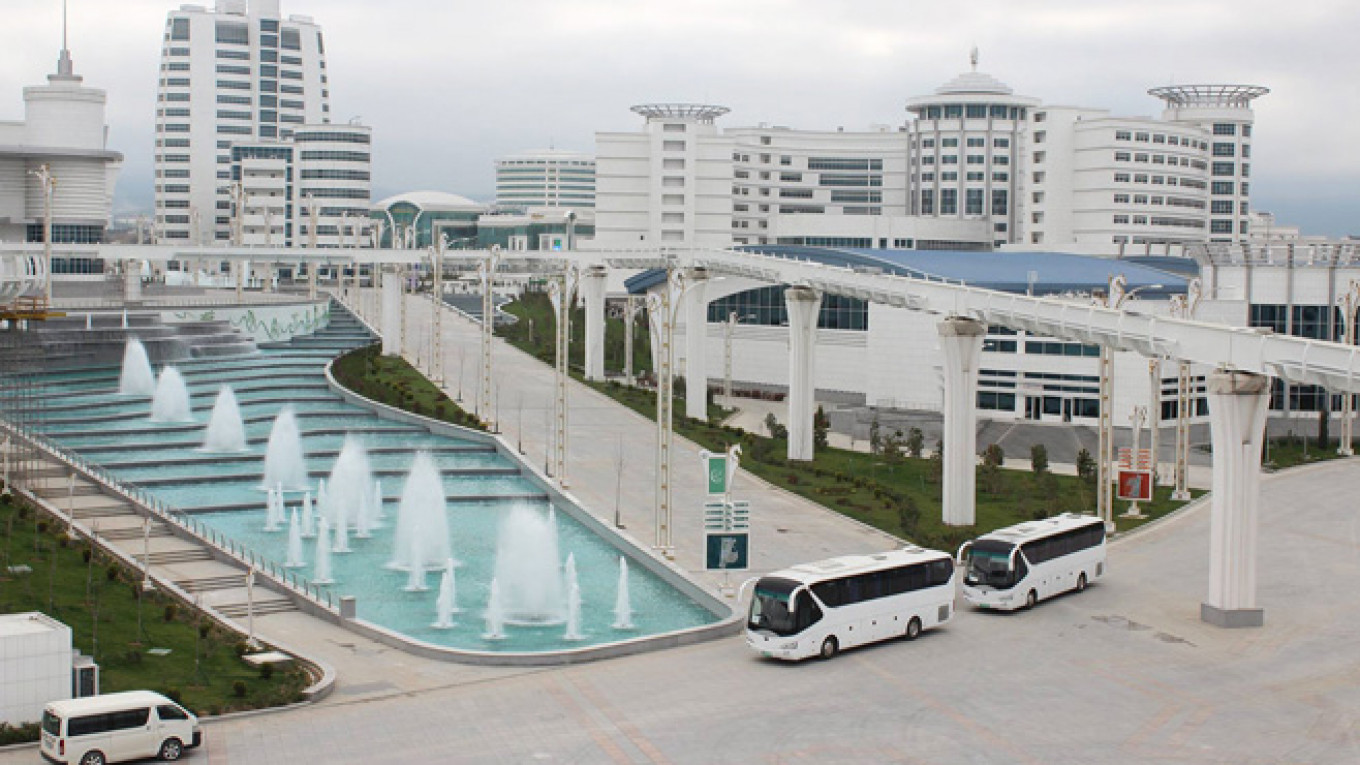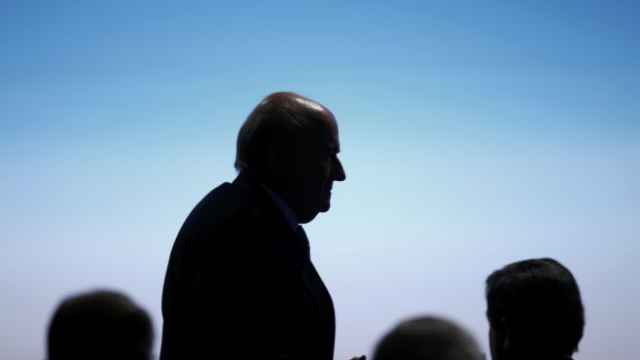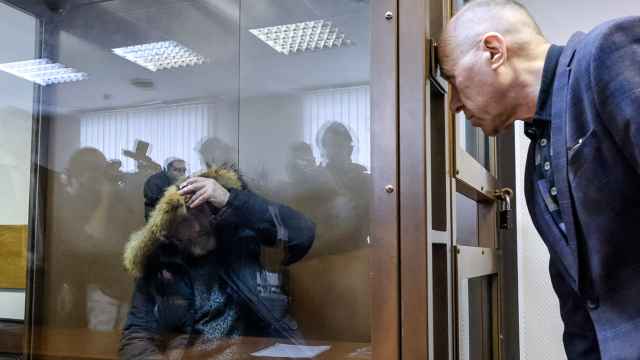ASHGABAT, Turkmenistan — Staged portraits of Turkmen President Gurbanguly Berdimuhamedow doing bicep curls, shooting hoops and reining in an untamable mare are ubiquitous throughout Turkmenistan's opulent National Institute of Sports and Tourism, which the country proudly showed off to international journalists last week.
Berdimuhamedow — a former dentist who succeeded authoritarian President Saparmurat Niyazov, the self-declared Father of the Turkmen, in 2006 — has made fitness a hallmark of his authoritarian leadership. The president, referred to affectionately among his countrymen as "Protector," has been portrayed as excelling in every imaginable sporting discipline, without a drop of sweat or a hair out of place.
The president's athletic inclinations have materialized in the form of a series of mega-infrastructure projects, including the construction of a $5 billion Olympic Complex in the heart of Ashgabat, where the biennial Asian Indoor and Martial Arts Games (AIMAG) will take place in 2017. Some 8,500 athletes from 62 nations, competing in 19 disciplines, will descend on the Turkmen capital for the occasion, making it the first large-scale international sporting event to be held in the former Soviet republic of 5.2 million.
The grandiose Turkmen capital, which set a Guinness World Record in 2013 for boasting the highest density of white marble buildings, has a taste for grandeur. Its flawless paved roads are broad, its gilded monuments towering. Synchronized lights illuminate the thousands of fountains that dot the desert cityscape of Ashgabat. The capital is home to the world's largest enclosed Ferris wheel, the largest handwoven carpet and a 6,000-seat velodrome, the largest cycle-racing track on the globe.
Ashgabat thinks big. Its sporting ambitions, like the lavishness of its construction projects, stretch far beyond the realm of practicality.
"Our esteemed president has a plan to expand after the 2017 Asian Indoor and Martial Arts Games, to up the ante," said Dayanch Gulgeldiyev, chairman of the AIMAG executive committee, speaking Friday at the International Sports Media Forum in Ashgabat. "He mentioned that we should prepare for more high-level events. These ambitions include a bid for the Olympic Games."
Their Olympic aspirations may appear to be at odds with Turkmenistan's broadly scrutinized rights record. "The country is virtually closed to independent scrutiny, media and religious freedoms are subject to draconian restrictions, and human rights defenders and other activists face the constant threat of government reprisal," international advocacy group Human Rights Watch wrote in its 2014 annual report.
But Turkmen officials claimed that the AIMAG and prospective bids for more prominent sporting events — if everything goes smoothly in 2017 — would open the country up to the world. Yet expressions of gratitude for the "esteemed president," a title used to designate Berdimuhamedow both in official forums and daily conversation, remains the leitmotif of Turkmen and foreign delegates' speeches about the country's sporting aspirations. The openness Turkmenistan seeks through hosting major sporting events, it would seem, stems from foreign expertise and investment that leave the social structure intact.
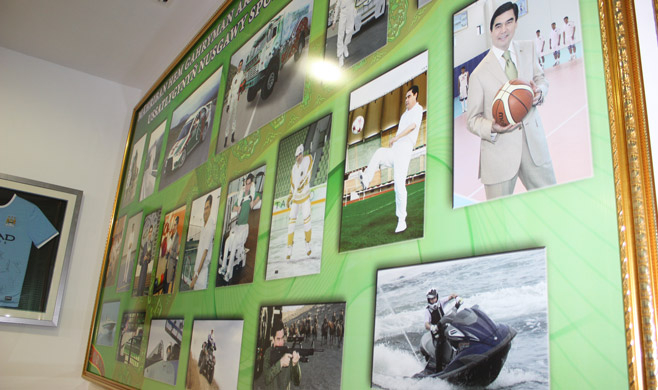
Turkmen President Gurbanguly Berdimuhamedow playing every imaginable sport.
Building a Dream
Turkmenistan is the only former Soviet republic to never have won an Olympic medal, despite having competed in every Summer Olympics since the 1996 Atlanta Games.
Sports connoisseurs gathered in Ashgabat last week struggled to name Turkmenistan's most distinguished athlete. The only person that came to mind was little-known former Soviet footballer Kurban Berdyev, who now coaches FC Rostov-on-Don in the Russian Premier League. Some joked that Turkmenistan's 57-year-old president was the country's most recognizable all-star.
This has not stopped the country from tying the Olympic rings — one of the world's most recognizable brands — to one of its stadiums and a sports complex currently under construction.
Showing off the ultramodern facilities last Thursday, the organizers of the 2017 AIMAG ushered sports officials and journalists through an ultraluxe VIP hotel, a multi-sport venue with one of the world’s biggest scoreboards, an arena for combat sports and the record-breaking velodrome. Turkmen officials claim that construction of Ashgabat’s 157-hectare Olympic Complex, begun in 2010 by Turkish company Polimeks, is far ahead of schedule. More than 51 million hours of work and nearly 138,000 square meters of marble went into the construction of the completed facilities.
Visitors oohed and aahed at the immaculate sports center, built according to the highest international standards. Rio de Janeiro, the host of the 2016 Summer Olympics, would be envious of Ashgabat's infrastructure and the state of its preparations, some sporting officials noted.
Despite having some of the world's most stringent visa requirements, Turkmenistan is eager to include foreign companies into its preparations for AIMAG. Azat Muradov, the head of Turkmenistan's National Olympic Committee, said the country was seeking international expertise on the branding of the Games. A tender is currently under way to outsource the creation of an official website for AIMAG.
MasterCard payment services, currently unavailable in Turkmenistan, will be installed in Ashgabat hotels for AIMAG. A wireless Internet connection will be available in the streets of the capital, which remained largely deserted through the course of last week's press tour. Foreign coaches, chefs and marketing moguls will be brought into the country to ensure the Games' success.
The Games' organizers have received "all the necessary guarantees" from the Turkmen government that delegates' credentials would serve as a visa to enter the country, Muradov said.
But international observers told The Moscow Times that a true liberalization of the country is unlikely to occur as a result of AIMAG.
Looking back at the history of the games in countries across the globe, Olympic scholar Bill Mallon wrote to The Moscow Times in an e-mail: "There is little evidence to suggest that holding the Olympics [ever caused a] society to become more open or less totalitarian."
No Limits
Turkmenistan's economy expanded by 10.3 percent in 2013 and sustained strong growth through the first half of 2014, according to the World Bank. The country holds the sixth-largest natural gas reserve in the world and was Eurasia's second-largest producer of dry natural gas after Russia in 2012, according to the U.S. Energy Information Administration.
Turkmen officials told The Moscow Times that there is essentially no limit to state spending when it comes to projects ordered by President Berdimuhamedow. Ashgabat's Olympic Complex costs nearly 12 percent of Turkmenistan's gross domestic product of $41.85 billion.
Foreign sports officials said that the 45,000-seat central stadium being built for AIMAG is not large enough to accommodate larger sporting events such as the Asian Games, where athletes from 45 countries compete in the 28 disciplines featured at the Summer Olympics.
Turkmen officials do not view stadium size as an obstacle to fulfilling their ambitious sporting dreams, insisting that AIMAG is a stepping stone to turning Ashgabat into a major international sports capital.
"I think that the facilities we have could be used for the Olympics," said Chary Mammedov, the head of the sports venue department of the AIMAG executive committee. "If we need another stadium [to eventually host the Asian Games or the Olympics], we will just build another one."
In Turkmenistan's Favor
Sports officials were split on whether Ashgabat's AIMAG facilities would be suitable for the Olympic Games. Turkmen officials admitted that "lots of work" needed to be done before the country could even contemplate bidding for the Olympics.
"The Olympic Games are a long way down the road," David Wallechinsky, the president of the International Society of Olympic Historians, told The Moscow Times in a telephone interview. "They need to prove themselves on a lower level starting as they are right now with AIMAG, which makes a lot of sense as a first step. But there are a lot of steps."
Other relatively rigid political regimes are set — or striving — to host major sporting events in the coming years. This year's European Games will be held in Baku, Azerbaijan, while Kazakhstan is in the running to host the 2022 Winter Olympics. Both countries have faced criticism for subpar transparency and weak democratic institutions.
Recent changes in the International Olympic Committee's requirements for candidate cities might just play in Turkmenistan's favor.
In December 2014, the IOC announced its 2020 Olympic Agenda, a collection of 40 recommendations on the future of Olympic movement. Some of the recommendations — including reducing the cost of Olympic bids, decreasing the number of participants in the Games and providing additional IOC guidance for candidate cities about the requirements and procedures to host the Games — make Turkmenistan's Olympic dreams a little more tangible.
The IOC's curtailed expectations regarding the number of participants and stadium capacity could eventually help Ashgabat raise its international sports profile, according to Oleg Matytsin, the first vice president of the International University Sports Federation (FISU).
"Olympic cities tend to be stuck with large stadiums that aren't used at full capacity," Matytsin told The Moscow Times. "I would not rule out the possibility that the Olympic Games might one day come to Ashgabat."
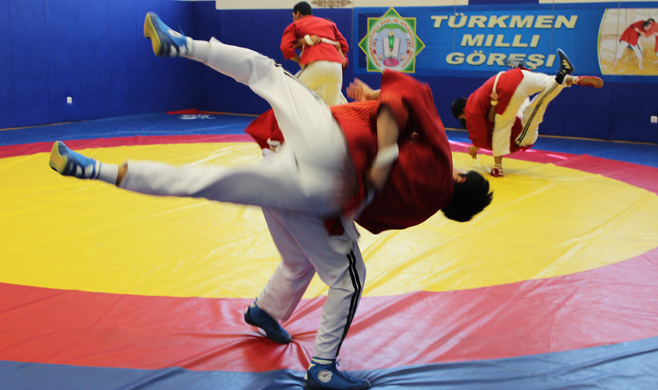
Student-athletes of Turkmenistan's National Institute of Sports and Tourism practicing traditional Turkmen belt wrestling.
Sports, A Human Right
Western countries castigated China and Russia for their lackluster human rights records ahead of the 2008 Beijing Summer Games and the 2014 Sochi Winter Olympics. Calls for boycotts proliferated and a handful of world leaders snubbed the opening ceremonies of these Games. But the initial outrage was quickly dispelled by the world's greatest sporting spectacle.
The international community might likewise view an Olympic bid by Turkmenistan with skepticism.
Human Rights Watch called the country one of the world's "most repressive" in its 2014 report.
Freedom of the press is virtually nonexistent. U.S.-based nongovernmental organization Freedom House ranked Turkmenistan 195 out of 197 in its most recent Freedom of the Press index. Turkmenistan shared its position on the list with Uzbekistan, with only North Korea ranking lower than the two of them.
And political prisoners are no rarity, according to Human Rights Watch, which wrote: "The government continues to use imprisonment as a tool for political retaliation."
Overall, the leadership of Berdimuhamedow is understood to be supreme.
Portraits of the president hang on every wall and Turkmen citizen hang on his every word. The president's speeches consistently draw uproarious applause, including from rows of students in jet-black suits and ties, wearing their traditional embroidered skullcaps known as takhya.
After Sapardurdy Toylyev, the deputy chairman of the Cabinet of Ministers, finished reading a letter on behalf of Berdimuhamedow that pledged Ashgabat would become an international sports hub, students of the National Institute of Sports and Tourism erupted into a standing ovation so precisely synchronized that it appeared rehearsed.
Some Asian sporting officials have lauded Turkmenistan's support for sports and fitness, describing it as a form of commitment to the population's general well-being. In 2012, Berdimuhamedow launched a nationwide Week of Health and Happiness, ordering students and government officials to take part in meticulously coordinated sporting events. Every ministry is obliged to form its own team to take part in these events.
The "Freshman 15" — the American stereotype that maintains first-year university students generally put on 15 lbs. — is unknown to Turkmenistan's university students. The student diet of beer and pizza in Western dormitories finds no equivalent in the country. Turkmen university students, even those not registered in sports intensive programs, are on a strict state-imposed training regimen. Its staple for Ashgabat's students is the mandatory weekly ascent and descent of the Serdar Health Path, an eight-kilometer stretch of concrete steps built into the hills of the Kopet Dag mountain range, just south of the city.
"You should see the poor students who are forced to go up and down all those stairs," said a local taxi driver, who asked to remain anonymous for purposes of this article. "Nobody really wants to put themselves through that. They do it because they have to."
Students from the National Institute of Sports and Tourism, the most athletic among Ashgabat's university community, praised the weekly ritual, saying they enjoyed the fresh air and awe-inspiring landscape.
"Participation in sports is a human right, which is something the government here [in Turkmenistan] supports," said Wei Jizhong, the vice president of the Olympic Council of Asia. "Sports are meant to prolong every human being's life. Human rights are only being interpreted as political rights. I understand human rights as being a vaster domain."
The Moscow Times was a guest of the Turkmenistan International Sports Media Forum 2015.
Contact the author at [email protected]
A Message from The Moscow Times:
Dear readers,
We are facing unprecedented challenges. Russia's Prosecutor General's Office has designated The Moscow Times as an "undesirable" organization, criminalizing our work and putting our staff at risk of prosecution. This follows our earlier unjust labeling as a "foreign agent."
These actions are direct attempts to silence independent journalism in Russia. The authorities claim our work "discredits the decisions of the Russian leadership." We see things differently: we strive to provide accurate, unbiased reporting on Russia.
We, the journalists of The Moscow Times, refuse to be silenced. But to continue our work, we need your help.
Your support, no matter how small, makes a world of difference. If you can, please support us monthly starting from just $2. It's quick to set up, and every contribution makes a significant impact.
By supporting The Moscow Times, you're defending open, independent journalism in the face of repression. Thank you for standing with us.
Remind me later.


